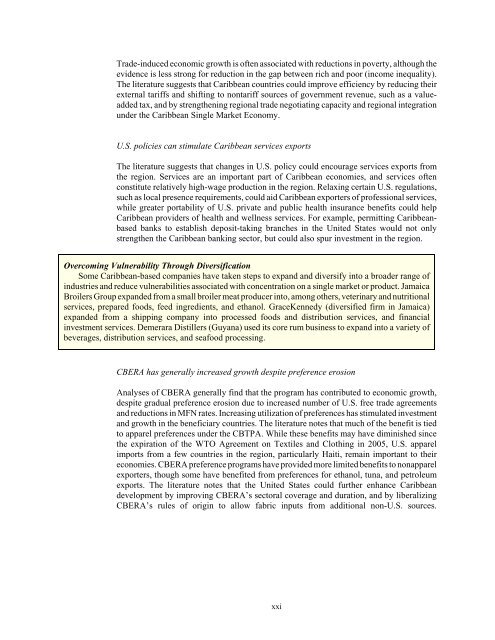Caribbean Region: Review of Economic Growth and ... - USITC
Caribbean Region: Review of Economic Growth and ... - USITC
Caribbean Region: Review of Economic Growth and ... - USITC
Create successful ePaper yourself
Turn your PDF publications into a flip-book with our unique Google optimized e-Paper software.
Trade-induced economic growth is <strong>of</strong>ten associated with reductions in poverty, although theevidence is less strong for reduction in the gap between rich <strong>and</strong> poor (income inequality).The literature suggests that <strong>Caribbean</strong> countries could improve efficiency by reducing theirexternal tariffs <strong>and</strong> shifting to nontariff sources <strong>of</strong> government revenue, such as a valueaddedtax, <strong>and</strong> by strengthening regional trade negotiating capacity <strong>and</strong> regional integrationunder the <strong>Caribbean</strong> Single Market Economy.U.S. policies can stimulate <strong>Caribbean</strong> services exportsThe literature suggests that changes in U.S. policy could encourage services exports fromthe region. Services are an important part <strong>of</strong> <strong>Caribbean</strong> economies, <strong>and</strong> services <strong>of</strong>tenconstitute relatively high-wage production in the region. Relaxing certain U.S. regulations,such as local presence requirements, could aid <strong>Caribbean</strong> exporters <strong>of</strong> pr<strong>of</strong>essional services,while greater portability <strong>of</strong> U.S. private <strong>and</strong> public health insurance benefits could help<strong>Caribbean</strong> providers <strong>of</strong> health <strong>and</strong> wellness services. For example, permitting <strong>Caribbean</strong>basedbanks to establish deposit-taking branches in the United States would not onlystrengthen the <strong>Caribbean</strong> banking sector, but could also spur investment in the region.Overcoming Vulnerability Through DiversificationSome <strong>Caribbean</strong>-based companies have taken steps to exp<strong>and</strong> <strong>and</strong> diversify into a broader range <strong>of</strong>industries <strong>and</strong> reduce vulnerabilities associated with concentration on a single market or product. JamaicaBroilers Group exp<strong>and</strong>ed from a small broiler meat producer into, among others, veterinary <strong>and</strong> nutritionalservices, prepared foods, feed ingredients, <strong>and</strong> ethanol. GraceKennedy (diversified firm in Jamaica)exp<strong>and</strong>ed from a shipping company into processed foods <strong>and</strong> distribution services, <strong>and</strong> financialinvestment services. Demerara Distillers (Guyana) used its core rum business to exp<strong>and</strong> into a variety <strong>of</strong>beverages, distribution services, <strong>and</strong> seafood processing.CBERA has generally increased growth despite preference erosionAnalyses <strong>of</strong> CBERA generally find that the program has contributed to economic growth,despite gradual preference erosion due to increased number <strong>of</strong> U.S. free trade agreements<strong>and</strong> reductions in MFN rates. Increasing utilization <strong>of</strong> preferences has stimulated investment<strong>and</strong> growth in the beneficiary countries. The literature notes that much <strong>of</strong> the benefit is tiedto apparel preferences under the CBTPA. While these benefits may have diminished sincethe expiration <strong>of</strong> the WTO Agreement on Textiles <strong>and</strong> Clothing in 2005, U.S. apparelimports from a few countries in the region, particularly Haiti, remain important to theireconomies. CBERA preference programs have provided more limited benefits to nonapparelexporters, though some have benefited from preferences for ethanol, tuna, <strong>and</strong> petroleumexports. The literature notes that the United States could further enhance <strong>Caribbean</strong>development by improving CBERA’s sectoral coverage <strong>and</strong> duration, <strong>and</strong> by liberalizingCBERA’s rules <strong>of</strong> origin to allow fabric inputs from additional non-U.S. sources.xxi
















